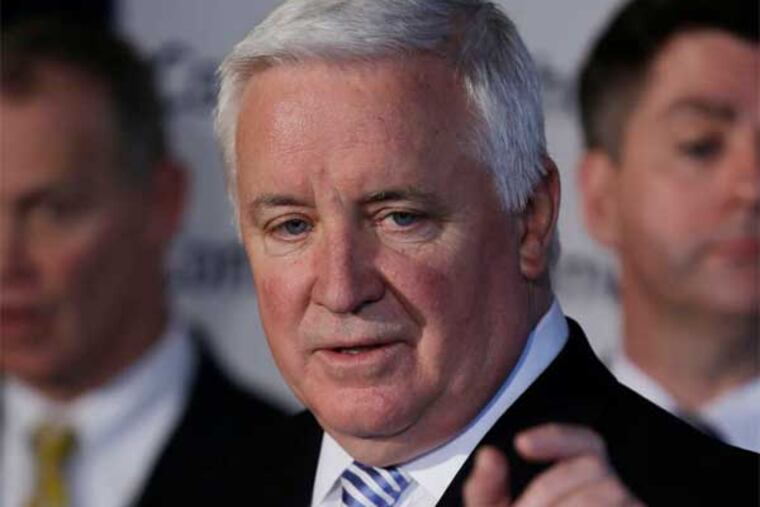Giving it away: PA subsidies a symptom of state-by-state competition
More than $2.5 million given out in May in corporate handouts

HARRISBURG — Pennsylvania next year faces about a $520 million budget gap, yet it's still giving businesses millions in grants and tax credits.
Why?
Because all the other states are doing it, that's why.
In the first quarter of 2013, the Governor's Action Team, responsible for selecting which companies get state subsidies, generated 76 projects, the highest number in two years. So far, 40 of those projects are finished or nearly finalized.
For just four projects announced in May, the state gave a total of more than $2.5 million in grants and tax credits. Collectively, those four projects — one a warehouse and three in manufacturing — pledge to create 894 jobs, about $2,845 invested by the commonwealth for each job created.
Gene Barr, president of the Pennsylvania Chamber of Business and Industry, said it would be great if the state could "unilaterally disarm" from such giveaways.
But it simply can't when similar packages are offered elsewhere, he said.
"As long as other states are doing it, Pennsylvania is kind of forced into it. I'd love to have to not go through all those. The trouble is that we have to. The trouble is, it works."
Pennsylvania has assets such as location, low energy costs and natural resources that are attractive to businesses, but that's not enough when the state also has a corporate net income tax of 9.99 percent and an oft-criticized regulatory environment, he said. The incentive packages help make up the difference.
"When you're laboring with that you have to do something to offset it," he said.
A high-profile example in play is a proposed deal with Shell Oil for an ethane cracker plant in Beaver County. The proposal carries a $1.65 billion tax break over 25 years. That deal has yet to be finalized, but Pennsylvania was competing against Ohio and West Virginia when putting together the super-sized subsidy for the $2.5 billion plant.
But on a smaller scale, subsidies have declined some in the Corbett administration. The department is working with a leaner budget and has seen many of its grant programs consolidated into the Pennsylvania First program.
Steve Kratz, spokesman for the Department of Community and Economic Development, said projects that get subsidies are often recommended by region economic development firms, commercial real estate developers or lawmakers.
When it comes to biting the bullet on the investment, Kratz said, the state is mindful of its own budget concerns. So the state tries to keep the packages small and focus on getting the greatest number of jobs as possible.
A recent award of $566,550 in grants went to American Eagle Outfitters, which will spend $160 million on a new distribution center at an industrial site in Luzerne County. The project pledges to create 369 jobs with an average wage of $36,345. That winds up being a $1,534 investment per job.
Before giving out such awards, DCED analysts look at how many years it will take until new tax revenues from the business make up for the initial state investment, Kratz said. The state is interested in targeting high-tech manufacturing, he said, because it provides sustainable jobs with higher wages.
"Quite often a lot of our financial assistance packages are very small portions of the overall capital investment being made by these companies," Kratz said. "We focus on making sure the projects we invest in are going to have a greater return on investment as far as capital investment and job creation."
Matthew Mitchell is a researcher on government subsidies at the Mercatus Center at George Mason University. He argues the costs of such handouts outweigh the benefits. That could include monopoly status, favored regulations, cronyism or non-competitive contracts.
"The problem is you end up with all those unintended consequences," Mitchell said. "Whenever you favor one firm over the other, it undermines competition, it undermines quality."
Beyond that, government subsidy programs that try to support developing industries, or the "jobs of the future," can often be wrong. Mitchell argues that venture capitalists of the private sector, by putting their money behind what's going to pay off, are experts in that realm.
"If that's correct, then we don't need any subsidies to force the hand," Mitchell said. "If high-tech jobs are really the jobs of the future, you'll see high-tech investments, which will lead to jobs and will lead to growth."
Despite the costs and criticisms, the system continues because of state-to-state competition. In another example, Pennsylvania is considering a $12 million sales tax break on airplanes, because all surrounding states have an exemption.
Ending the cycle is likely out of a single state's hands.
"That's very difficult for a state to do on their own," Mitchell said. "They face such extraordinary pressure with incentives to try to lure more firms, more capital."
Any solution may be far-fetched, Mitchell said. First, get states to agree to stop giving handouts, a type of interstate free-trade agreement. Then, let the states decide their individual tax climates to determine what's best for business.
But try making that happen with industries throwing their weight into state lobbying efforts to secure sweetheart deals, Mitchell said, or getting states to work collectively.
Putting a stop to government handouts does have one ray of hope – one of those rare, indelible issues that draws the ire of tea party members and "occupy" activists alike.
"Whether you think government should have a larger role in the economy or not," Mitchell said, "most people on either side of the aisle don't like the idea of picking winners and losers."
Contact Melissa Daniels at melissa@paindependent.com